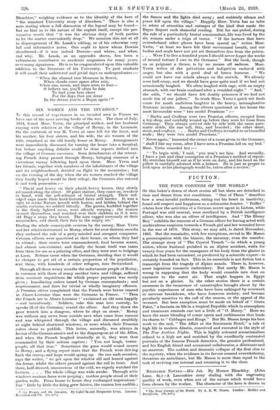FICTION.
THE FOUR CORNERS OF THE WORLD.*
OF this baker's dozen of short stories all but three are detached in time and theme from war conditions. " One of Them " describes how a semi-invalid yachtsman, eating out his heart in inactivity, found self-respect and happiness as a submarine-hunter. " Peiffer " relates how the activities of a German secret agent in Lisbon, while Portugal was still neutral, were sterilized by a British intelligence officer, who was also an officer of intelligence. And " The Ebony Box " exhibits the remorse of a German officer for having acted with unchivalrous suspicion towards a French girl and her wounded lover in the war of 1870. This story, we may add, is dated November, 1905. But the remainder, with few exceptions, reveal in Mr. Mason a preoccupation with the bizarre, the uncanny, even the macabre. ,The strange story of " The Crystal Trench "—in which a young widow, whose husband perished in an Alpine accident, waits for twenty-four years for the emergence of his body from the glacier in which he had been entombed, as predicted by a scientific expert—is certainly founded on fact. This in its essentials is not fiction but a transcript from the tragedy of Alpine annals. There is, however, some ingenious romantic embroidery. But surely Mr. Mason is wrong in supposing that the body would crumble into dust on exposure to the outer air. That might happen in Egypt but not on a glacier. In the other stories there is a certain sameness in the recurrence of catastrophes brought about by the psychic experiences of men who have been unhinged by overwork or nervous breakdown, who have forsworn society, and become peculiarly sensitive to the call of the unseen, or the appeal of the revenant. But here exception must be made on behalf of " Green Paint," a fantasia on life in a tropical Republic which in atmosphere and treatment reminds one not a little of " O. Henry." Here wo have the same blending of comic opera and ruthlessness that lends its charm to " Cabbages and Kings." But Mr. Mason keeps his best work to the end, " The Affair at the Semiramis Hotel," a tale of high life in modern Alsatia, conceived and executed in the style of The New Arabian Nights. This is highly coloured sensationalism refined to a high art and enriched by the excellently contrasted portraits of the famous French detective, the genuine professional, and his English friend and occasional collaborator, a dilettante and an amateur. The sudden and dramatic collapse of the first clue to the mystery, when the evidence in its favour seemed overwhelming, threatens an anticlimax, but Mr. Mason is more than equal to the task of reviving our interest and retaining it to the close.


































 Previous page
Previous page